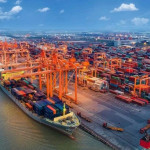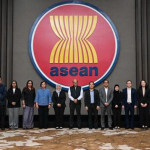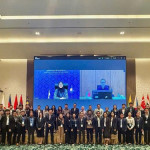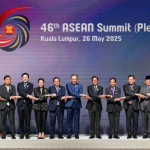Total number of posts 463.
Report on the implementation of the Comprehensive and Progressive Agreement for Trans-Pacific Partnership (CPTPP), the Free Trade Agreement between Vietnam and the European Union (EVFTA) and the Free Trade Agreement between Vietnam and the United Kingdom of Great Britain and Northern Ireland (UKVFTA) of ministries, sectors and localities in 2022 of the Ministry of Industry and Trade show that, in order to implement the CPTPP, UKVFTA, EVFTA, Vietnam continues to improve the legal system governing industrial relations and labor standards in accordance with international standards, commitments and conventions on labor as well as sustainable development that Vietnam has acceded to.
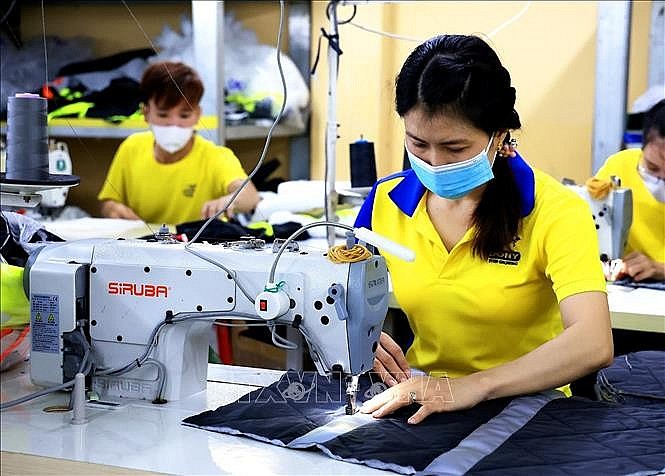
Vietnam continues to improve its legal system and implement its labor commitments. Photo: VNA
Accordingly, recently, with the efforts of the Government of Vietnam and stakeholders, by the end of December, 2022, Vietnam has acceded to 25 conventions of the International Labour Organization (ILO), including 9/10 basic conventions, 3/4 governance conventions and 13 technical conventions. This demonstrates Viet Nam's efforts in researching and ratifying relevant ILO Conventions, demonstrating its seriousness in implementing labour commitments in CPTPP, EVFTA and UKVFTA.
With regard to Convention 98 – Application of the principles of the right to organize and collective bargaining and Convention No. 105 – Abolition of forced labour, after the National Assembly ratified the accession to the above 2 Conventions, the Prime Minister issued an implementation plan in accordance with Decision No. 673/QD-TTg dated May 7, 2021 and Decision No. 2234/QD-TTg dated December 30, 2021. The content of the above Conventions is internalized in the Vietnamese legal system, especially the Labor Code 2019. After nearly 3 years of implementation, despite being heavily affected by the Covid-2019 pandemic, the provisions of the Labor Code 2019 are basically implemented relatively well by the business community and employees, without major difficulties and obstacles.
In particular, in 2021, the Government of Viet Nam submitted the first National Report on the implementation of Convention No. 98. In 2023, Viet Nam has developed and sent the ILO a second report on the implementation of Convention No. 2 and the first report on the implementation of Convention No. 98 on the elimination of forced labour. With regard to Convention No. 105 – Freedom of Association, the Ministry of Labor, War Invalids and Social Affairs has issued a study plan and proposal to accede to Convention No. 87.
The Plan has identified 7 specific groups of work to be carried out to propose accession to the Convention and promote the completion of documents in the Dossier of accession to the Convention in accordance with the Law on Treaties for submission to competent authorities for discussion and comments. Although not yet ratified, the basic contents of Convention 87 have been internalized in the 2019 Labor Code, specifically the organization of workers who are not part of the Vietnam General Confederation of Labor system and its activities in representation, protect the interests of employees in industrial relations.
In addition, regarding the amendment and supplementation of the labor law, according to the Ministry of Industry and Trade, up to now, in the field of labor, Vietnam has issued the Labor Code 2019 and then 05 Decrees, 01 Decision of the Prime Minister and 02 Circulars to implement the Labor Code 2019. The Decree on employee representative organization and collective bargaining contains many new, complex and unprecedented contents for the Vietnamese legal system that need to continue to be studied and developed dossiers to be submitted to competent authorities for discussion and comments before promulgation.
Records show that, locally, most provinces and cities focus on improving the lives of workers, strengthening reconciliation between workers and enterprises, urging trade unions in the province to actively work with business owners to resolve petitions, entangle, ensure the legitimate rights and interests of employees.
Along with that, Vietnam also promotes the consolidation of the organization of the state agencies managing the establishment and operation of workers' organizations at enterprise grassroots. Specifically, on the basis of the Government's Decree No. 62/2022/ND-CP dated September 12, 2022 stipulating the functions, tasks, powers and structure of the Ministry of Labor, War Invalids and Social Affairs and the Ministry of Labor. The Ministry of Labor, War Invalids and Social Affairs has also developed a Decision defining the functions, tasks, powers and organizational structure of the Department of Industrial Relations and Wages, inheriting regulations on the task of advising the Ministry to perform the function of state management of the representative organization of employees at enterprises. At the same time, the Ministry of Labor, War Invalids and Social Affairs has directed the Department of Industrial Relations and Wages to arrange and arrange civil servants to perform this task.
In addition, the Ministry of Labor, War Invalids and Social Affairs has developed Circular No. 11/2022/TT-BLDTBXH dated September 30, 2021 guiding the functions, tasks and powers of the Department of Labor, War Invalids and Social Affairs under the People's Committees of provinces and cities. Accordingly, the Department of Labor, War Invalids and Social Affairs shall guide and organize the implementation of the provisions of labor law on the registration and state management of the organization and activities of employees at enterprises in accordance with the provisions of law and as assigned or authorized by the People's Committee of the province.
Currently, the Ministry of Labor, War Invalids and Social Affairs is researching and urgently completing law projects related to the social sector, including: Developing a new resolution on social policies for the period of 2023-2030, vision 2045, expected to be submitted to the Central Committee in the October session. It is expected that this Resolution will replace Resolution No. /NQ-TW dated June 01, 2012 of the Central Committee on a number of social issues in the period 2012-2020 with breakthroughs in approaching and solving social issues to meet the country's development requirements.
The amended Social Insurance Law is also expected to be submitted to the 1st National Assembly in October, 2023 session. According to the plan, the Law will focus on amendments and supplements to meet the requirements of Resolution 28/NQ-TW of the XII Central Committee on reforming social insurance policies towards building a multi-tiered social insurance system covering the whole people. At the same time, study and complete the dossier of the Employment Law, conduct a summary study and evaluate the implementation of the Law on the Elderly and the Law on People with Disabilities to improve the efficiency of implementation and have a basis for amending and supplementing these laws in the coming time.
On the local side, according to the Ministry of Industry and Trade, provinces and cities all focus on social security policies to support workers, especially in the context of labor difficulties due to the Covid-19 pandemic. The policies implemented are relatively diverse from strengthening business connections with vocational education institutions, financial support, training, propaganda and training.







